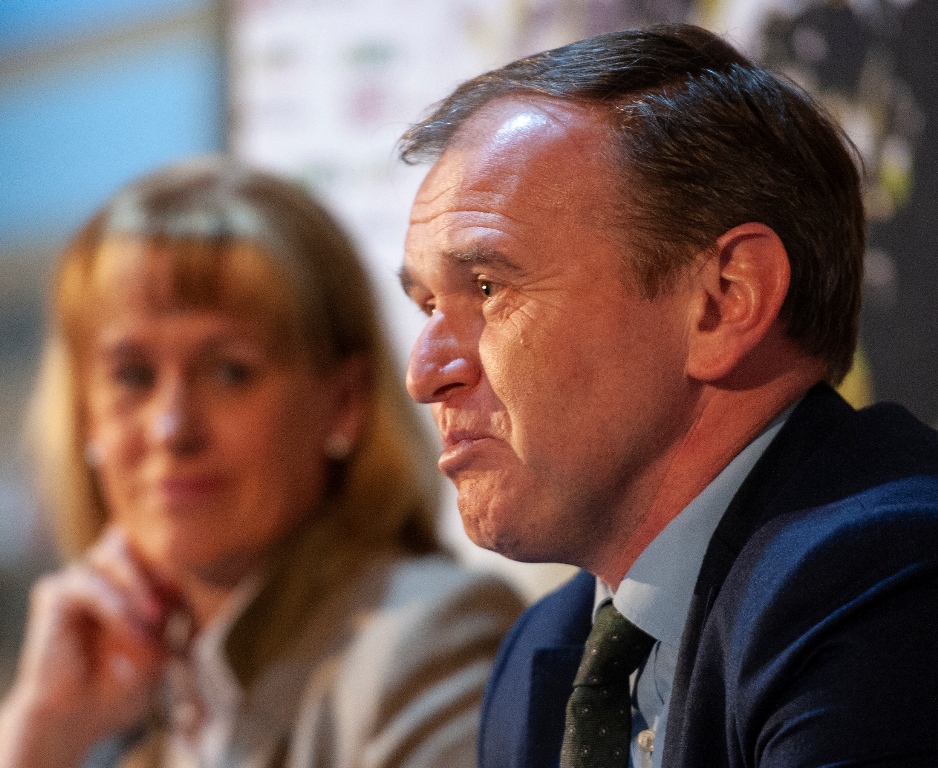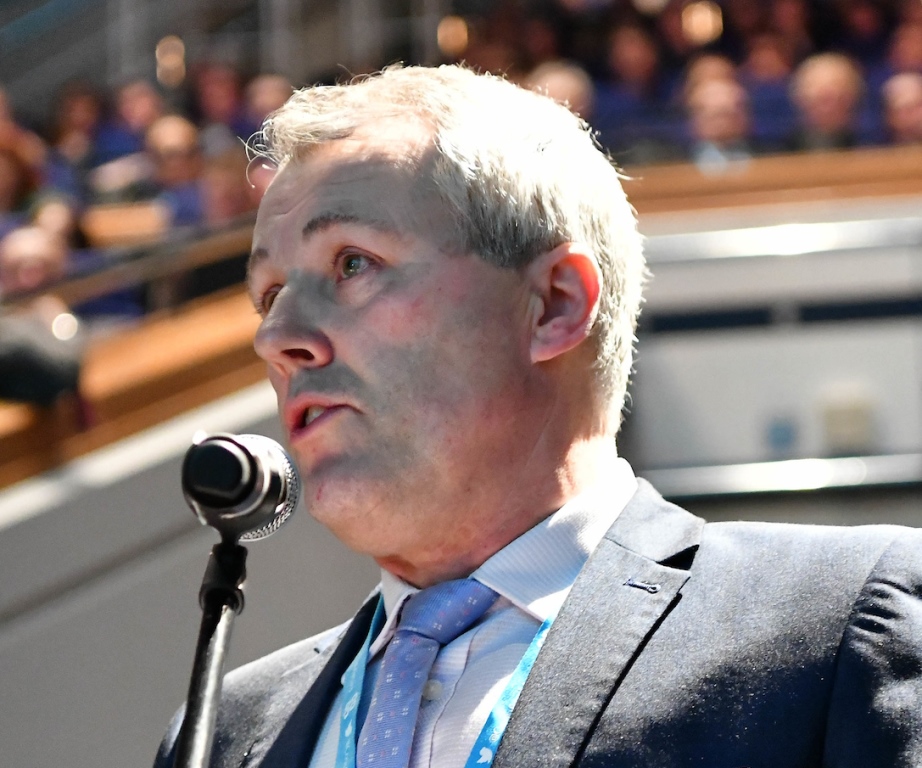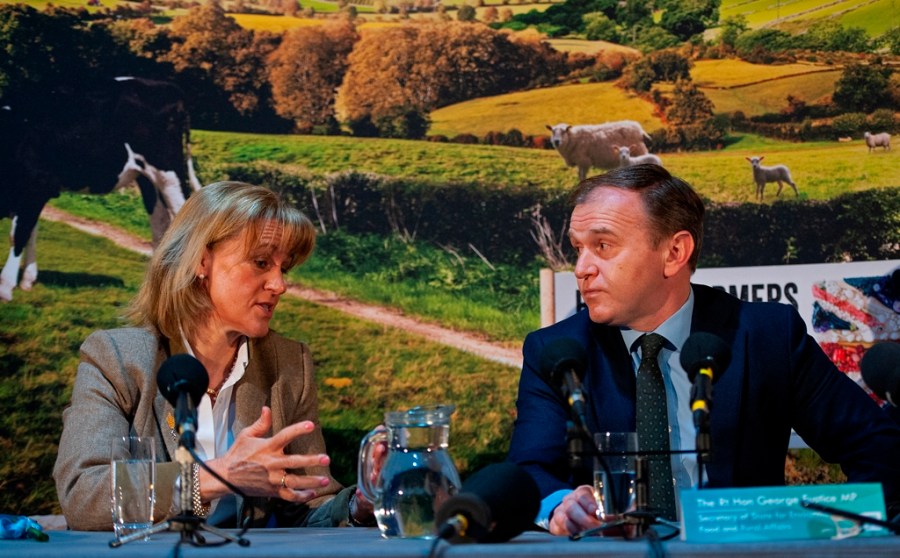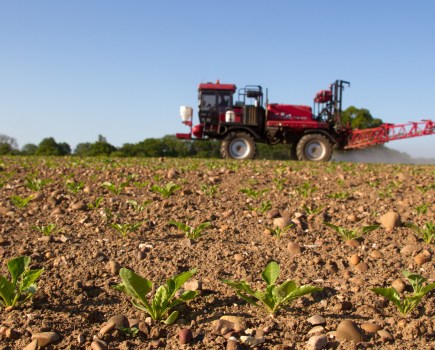The new Defra Secretary of State George Eustice was criticised for failing to live up to expectations and thwarting ambition when he addressed the NFU conference and took questions from hard-pressed farmers. CPM was there to gauge the mood.
The responsibility that sits on his shoulders is huge.
By Tom Allen-Stevens
If a Defra Secretary of State has ever enjoyed a honeymoon period after being appointed, George Eustice’s glowing moment appeared to end abruptly at the NFU conference last month.
Less than two weeks into the job he found himself facing jeers of discontent from around 1300 of the nation’s farmers for failing to offer a derogation on the crop diversification, or three-crop rule. The NFU had requested the derogation on behalf of the many farmers who have failed to drill enough of their planned 2020 crop and could lose entitlement to their Basic Payment as a result. [UPDATE: The derogation has now been granted]
“It’s a bonkers rule, I accept, and that’s why it won’t be staying for long,” he told the delegates during a question-and-answer session following his address to the conference in Birmingham.
“We’ve brought over the CAP in its current form for this final year. We will make extensive changes to it next year. But for now, if there are particular issues around farmers not being able to get crops in the ground, as far as I’m concerned that’s a force majeure event.”

George Eustice said farmers could still plant crops until the end of July to satisfy the three-crop rule, denying the need for a derogation.
NFU president Minette Batters pointed out that would lead to thousands of applications to Defra that would “bind your department for ever and a day”.
George said applications wouldn’t be considered until August. “So as long as you get a crop in before June or July you’ll be OK,” he suggested, prompting murmurs of dismay from delegates.
“These might be the best farmers in the world, but I don’t think they’ve ever planted anything in July,” Minette retorted.
It was the same on the transition period – George confirmed the seven-year phase out of direct subsidy payments is to start in 2021, which will see payments in England cut by 5% for those receiving up to £30,000, with reductions up to 25% for the largest holdings.
This is to make way for a new agricultural policy which he said would be not only right for farmers today but attract new entrants. “[These are] the farmers we don’t yet know. Who are not in this room. Those who yearn to go into farming but cannot get access to land. The farm managers who want to set out on their own and maybe those who left the family farm 20 years ago but wish they could find a way to return.”
He called on delegates to embrace the change. “Let’s not cling to the railings of a sinking ship that is the Common Agricultural Policy. Let’s not counsel for dither or delay. We have some of the most innovative farmers in the world. We can do this, so let’s begin it now.”
But a delay is what the NFU and other UK farming unions have asked for, noting that government plans are already behind, so the drawdown should start in 2022.
Environmental Land Management
But George dismissed these concerns, claiming 40 tests and trials for the new Environmental Land Management (ELM) scheme, that will replace BPS, are already underway with a full pilot set to start next year.
“There will be productivity grants and retirement schemes and we will be looking at how we can loosen up Countryside Stewardship. It will be an orderly transition and I think seven years is the right timeframe,” he added.
He offered some detail on the ELMs which the Government plans to roll out by the end of 2024. They’ll be open to all and have three components:
- A sustainable farming incentive will be open to any farmer and will incentivise participation in farm-level measures such as integrated pest management, sensitive hedgerow management and soil health.
- A local environment tier will incentivise interventions including the creation of habitats, improving biodiversity, tree planting, and natural flood management.
- A landscape-scale tier will support woodland creation, peatland restoration and other potential land use changes.

Andrew Ward called for an inquiry into how it was acceptable for parts of Lincs to be under 3m of water.
But his proposed policy of natural flood management came under fire from Lincs grower Andrew Ward. He called for an inquiry into how it was acceptable for parts of his county, that produces a fair proportion of the nation’s food, to be under 3m of water.
But George dismissed calls for an inquiry, pointing out the Government spent £2.5bn on flood defences over the past five years and is set to double that over the next five. “A big part of our solution is going to be nature-based solutions, trying to hold water upstream using natural flood plains, planting more trees, using natural dams and the like. We will be spending record amounts of money on flood defences,” he said.
“If you have a month of rain in 24hrs, nature-based solutions don’t mean anything,” Minette pointed out. “You have to be able to store water – we are wasting one of the world’s most precious natural resources.
“The Prime Minister is talking about spending hundreds of billions of pounds on infrastructure. Surely water should be fitting into that new world of infrastructure funding?”
This forms one of the key NFU requests of the Government as the Agriculture and Environment Bills pass through Parliament. “We currently produce only 7% of fruit we eat and only 53% of our veg in the UK,” Minette pointed out during her keynote speech the day before.
“We import the rest from some of the most water-stressed parts of the world like Israel, Chile and Spain. We have a bountiful supply of water, but we ask the rest of the world to use their scarce water supplies to produce the food that we could and should be growing at home.”
But it was on food standards where Minette applied most pressure. “This year the Government must show global leadership, insist that UK farm standards are the benchmark for climate-friendly farming around the world, and that whoever wants to trade with us trades on our terms,” she stressed.
She insisted those standards must not be undermined by imports, calling out examples of food production standards around the world that would be illegal to follow here. “To sign up to a trade deal which results in opening our ports, shelves and fridges to food which would be illegal to produce here would not only be morally bankrupt, it would be the work of the insane,” she said.
But the Cabinet cannot be trusted to deliver this. “I know that this will test the moral compass of some in government,” she said. “It’s absolutely vital there is a specialist body of experts set up to oversee trade regulations regarding agriculture and food. A Trade and Standards Commission.” She called for this protection for farmers to be enshrined in law in the Agriculture Bill, a move she said was supported by 60 environmental and farming organisations.
So will she get what she wants? Under the tag line for the conference “Farming without barriers”, Minette delivered a vision she said was “ambitious”, of UK farmers playing their part in the global food and environmental challenge. “Farmers, we can do this,” she said.
But there was a different tone in her closing remarks, following George’s address. “I was really disappointed today because the responsibility that sits on his shoulders is huge and I just didn’t feel that he gave us that ambition. He talks about opportunity but he doesn’t talk about the plan. We own the plan. We know how this can work, and we didn’t get that back today,” she said.
She recognised that it takes the help of “partners” and particularly the Government for UK Farming to achieve the vision she set out, pointing out that with a majority of 80, it was a “very powerful government”, and that even George may struggle to put the case forward for British farmers.
“I know in his DNA and in his heart he believes in it. But it’s clear now that he has to toe the government line. We all have to make sure our MPs understand our ambition,” she said.
She left the stage to a standing ovation, was re-elected as president without contest, and many of the delegates at the conference remarked that this is the strongest leadership farmers have experienced for some time.
But it may not be farmers’ leadership that’s lacking, she suggested, during an impromptu press briefing. “I’ve got no doubt about [George’s] passion for our industry. He understands his brief, probably better than anybody else any of us have worked with. But this is all about his influence in the Cabinet and particularly with the Treasury,” she said.
“We were all encouraged when Michael Gove took office. His understanding of the sector was very low. But he built his understanding and he could make a case to Treasury. And that is the challenge that George faces, is he going to be able to influence the Home Office on labour? Is he going to be able to influence the Department of International Trade on food standards? There is a lot of responsibility on his shoulders.”




